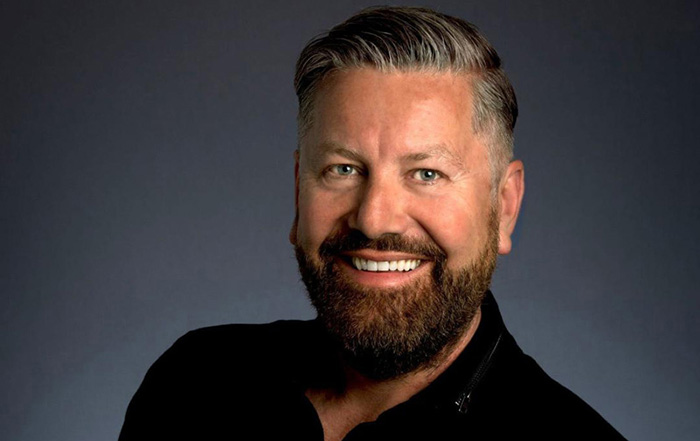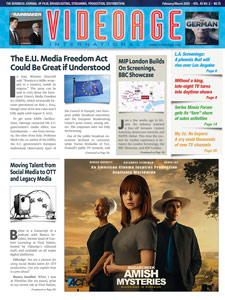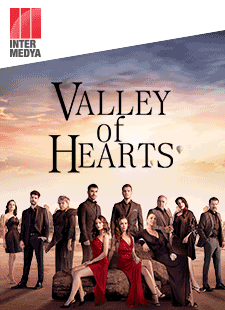Within the entertainment industry, halting production was one thing but re-starting will be another. Calls across every strata of the industry in France, Germany, and the U.K., resulted in a uniform response as to what has happened, and equally similar thoughts on where the industry might go. However, one thing is certain, and was summed up well by former Malta Film Commissioner Engelbert Gresch, who now heads Malta-based HALO Productions, “COVID is definitely changing the film and television landscape.”
James Burstall (pictured above), CEO of Brit indie production house Argonon (which has secured 100 hours of commissions across the world since lockdown), took time for an e-mail interview about how the situation affected him, his company and the people he works with.
VideoAge International: How have you survived up to now and how soon into the pandemic did you begin to change how you operated?
James Burstall: Ahead of lockdown, as the potential impact on our business became apparent, I formed a planning group, consisting of leaders across [our] six production companies. The team worked day and night over those crucial first weeks to enable [management] to react quickly and decisively on any information, and reset ourselves for the challenges ahead. As a leadership team, we set ourselves immediate, short– and medium-term targets to ensure the business had a clear focus and direction of travel, acting with calm but urgent purpose in the midst of a once-in-a-century storm.
VAI: What changes did you have to implement in order to get through?
JB: With over 250 permanent staffers operating out of our five headquarters in the U.K. and the U.S., we made immediate changes to keep us operational, aided by our previous investment in technology. We maintained production capability by creating 30 remote edit suites in 48 hours and transferring 1,500 staff and crew logins to their homes. We accelerated filming across our shows ahead of lockdown, which ensured we’d have a content pipeline working through those edit suites during lockdown. By leaning deeply into our IP, we were able to deliver updated stories from our most-loved shows. Flexibility was also key. BriteSpark Films, one of our U.K. production companies, pivoted into current affairs from its core factual roots, which led to two fast turnaround Channel 4 documentary commissions around the COVID-19 crisis. And our New York team developed a brand-new series under lockdown conditions, House Hunters International: The Adventure Continues, quite literally directed remotely from another continent.
VAI: How big were the changes you had to make?
JB: The changes that we are undertaking are seismic; we’re never going back to how we previously operated. Greater flexibility is going to be at the heart of current and future production. Flexibility in how we crew up for shoots — we are going to work with more local crews armed with local knowledge as we’ll all be flying less. Flexibility in how we operate as a group, sharing footage, exploiting the group’s archive and combining crews on shoots. And nimbleness in how we shoot; identifying the international locations where we can best achieve our goals in daily changing circumstances. The way we make programs has now fundamentally changed. Keeping our crews and contributors safe during production has meant an extensive and exhaustive list of protocols are in place to ensure we are COVID-secure.
VAI: Money has always been a big problem. Has it now become an even bigger problem with all the extra costs?
JB: We’re co-production experts. This has always been a core part of our business as it enables us to produce high-end scripted, specialist, factual, or entertainment programming which can cost in excess of £1million ($1.3 million) per hour. Every broadcaster or platform wants the very best content, but not everyone can afford to pay for the whole production, so we effectively provide a bridge.
We have always had a blend of finance options in our armoury, depending on the program, genre, and broadcaster. By being able to offer a mixed ecology of budget solutions, producers will be able to get more programs on air. Increased budget pressures, driven by the rising cost of production and stress in the advertising market, will only accelerate the trend towards co-production in a post-COVID world.
VAI: With all the “medical requirements” while shooting and the added crew members needed to put these measures into effect, how will that be met financially? And is there a concern that having extra people on the set, even if they’re working to save lives, could actually have the opposite effect?
JB: We have spent hundreds of hours consulting with experts across our industry to put in place rock-solid protocols and extensive safety precautions for our crews, whether out in the field on documentaries or based in the studio on entertainment shows.
Broadcasters will always need great programming and ultimately, it’s their responsibility to foot the bill. We’re now living in a world where tough decisions may have to be made, and in the case of some commissions, giving serious consideration as to the economic viability of going into production.
VAI: How are you overcoming shooting requirements?
JB: One of our companies, Windfall Films, is filming in several countries at any one time and recently required additional footage for an international co-production series. However, returning to the location was not possible, so they replaced live action with animation. We’re also making best use of our existing library across the group. For example, we have shot in over 160 countries for our Leopard USA show House Hunters International. We’ve piggy-backed shoots being organised by one of our production companies to help another secure the shots they need, without the need to travel.
VAI: What is the situation for freelancers during and after COVID?
JB: We’ve tried to help our teams by utilizing the furlough scheme in the U.K. where necessary and by extending staff contracts in the U.S. to ensure our crews had medical cover. [But] the best way we can help is to get back to full operational capacity. We’re filming in over 20 countries this month [September] and most of our crews are now back in the field.
VAI: Has COVID given producers and channels/streamers a different idea of what audiences want, or should any pattern be discounted because of audiences being in lockdown?
JB: At the start of the pandemic, many broadcasters commissioned COVID-themed content, as our understanding of the virus was low. Next, with the limitations of filming and the majority of the global population operating from home, came remote-themed programming, where virtual and often homemade programming was used across factual and current affairs programming. We’ve since seen a commissioning shift back towards higher production values, with program quality at the core.
Creatively, we have seen two trends — bright feel-good entertainment, in scripted and non-scripted, which provides escapist themes to the current world. We’re seeing this across all genres, and these shows are being rewarded with strong ratings. We may have seen the start of a second trend with a new documentary chronicling the life of people living on council estates [public housing] in the U.K. We saw similar programming emerge out of the credit crunch of 2008 and whilst it’s important to capture life in the modern-day world, there is a danger that it makes the world feel darker.
(By Mike Reynolds)
Audio Version (a DV Works service)












Leave A Comment